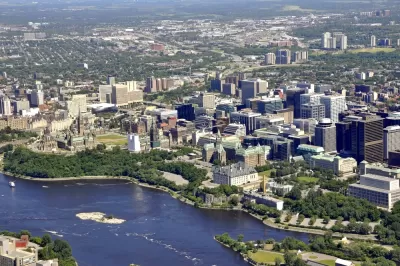Canada’s capital city recently completed the first step toward adopting a new Transportation Master Plan.

Canada’s capital city of Ottawa recently approved a new Transportation Master Plan (TMP), setting ambitious goals to improve transportation’s role in growth, climate change, mobility technology, traffic safety, and affordability over the next two decades.
According to an April 26 press release posted on the city’s website, the Ottawa City Council vote approved step one in the TMP process, adopting new policies to guide the city’s planning decisions. Step two will require a capital infrastructure plan that identifies transit and road projects.
A “Highlights” document available online provides additional details about the policies approved by step one. Among the strategies listed in the document to meet the needs of a growing city are coordinating land use and transportation planning, cooperating with other cities and governments in the region, and reducing greenhouse gas emissions from transportation.
The most recent news story on step one of the TMP, written by Laura Glowacki for CBC News, focuses on the TMP’s intentions to close gaps in the city’s bike infrastructure network.
FULL STORY: Council approves updates to the City’s Transportation Master Plan

Manufactured Crisis: Losing the Nation’s Largest Source of Unsubsidized Affordable Housing
Manufactured housing communities have long been an affordable housing option for millions of people living in the U.S., but that affordability is disappearing rapidly. How did we get here?

Americans May Be Stuck — But Why?
Americans are moving a lot less than they once did, and that is a problem. While Yoni Applebaum, in his highly-publicized article Stuck, gets the reasons badly wrong, it's still important to ask: why are we moving so much less than before?

Using Old Oil and Gas Wells for Green Energy Storage
Penn State researchers have found that repurposing abandoned oil and gas wells for geothermal-assisted compressed-air energy storage can boost efficiency, reduce environmental risks, and support clean energy and job transitions.

Updating LA’s Tree Rules Could Bring More Shade to Underserved Neighborhoods
A new USC study finds that relaxing Los Angeles’ outdated tree planting guidelines could significantly expand urban tree canopy and reduce shade disparities in lower-income neighborhoods, though infrastructure investments are also needed.

California's Canal Solar Projects Aim to Conserve Resources and Expand Clean Energy
California’s Project Nexus has begun generating electricity from solar panels installed over irrigation canals, with researchers and state agencies exploring statewide expansion to conserve water and boost clean energy production.

HHS Staff Cuts Gut Energy Assistance Program
The full staff of a federal program that distributes heating and cooling assistance for low-income families was laid off, jeopardizing the program’s operations.
Urban Design for Planners 1: Software Tools
This six-course series explores essential urban design concepts using open source software and equips planners with the tools they need to participate fully in the urban design process.
Planning for Universal Design
Learn the tools for implementing Universal Design in planning regulations.
Heyer Gruel & Associates PA
City of Moreno Valley
Institute for Housing and Urban Development Studies (IHS)
City of Grandview
Harvard GSD Executive Education
Salt Lake City
NYU Wagner Graduate School of Public Service
City of Cambridge, Maryland





























